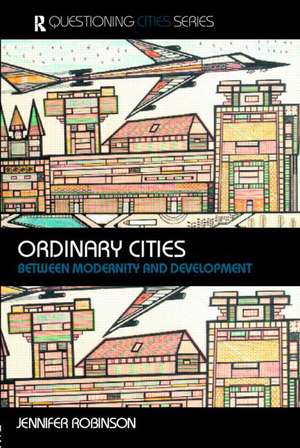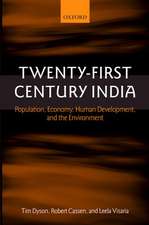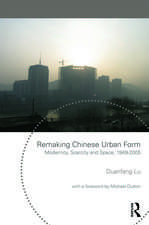Ordinary Cities: Between Modernity and Development: Questioning Cities
Autor Jennifer Robinsonen Limba Engleză Paperback – 8 dec 2005
This groundbreaking book establishes a new framework for urban development. It makes the argument that all cities are best understood as ‘ordinary’, and crosses the longstanding divide in urban scholarship and urban policy between Western and other cities (especially those labelled ‘Third World’). It considers the two framing axes of urban modernity and development, and argues that if cities are to be imagined in equitable and creative ways, urban theory must overcome these axes with their Western bias and that resources must become at least as cosmopolitan as cities themselves.
Tracking paths across previously separate literatures and debates, this innovative book - a postcolonial critique of urban studies - traces the outlines of a cosmopolitan approach to cities, drawing on evidence from Rio, Johannesburg, Lusaka and Kuala Lumpur. Key urban scholars and debates, from Simmel, Benjamin and the Chicago School to Global and World Cities theories are explored, together with anthropological and developmentalist accounts of poorer cities. Offering an alternative approach, Ordinary Cities skilfully brings together theories of urban development for students and researchers of urban studies, geography and development.
| Toate formatele și edițiile | Preț | Express |
|---|---|---|
| Paperback (1) | 295.58 lei 6-8 săpt. | |
| Taylor & Francis – 8 dec 2005 | 295.58 lei 6-8 săpt. | |
| Hardback (1) | 1002.02 lei 6-8 săpt. | |
| Taylor & Francis – 8 dec 2005 | 1002.02 lei 6-8 săpt. |
Din seria Questioning Cities
- 25%
 Preț: 218.03 lei
Preț: 218.03 lei - 15%
 Preț: 539.88 lei
Preț: 539.88 lei - 22%
 Preț: 297.57 lei
Preț: 297.57 lei -
 Preț: 407.01 lei
Preț: 407.01 lei -
 Preț: 445.31 lei
Preț: 445.31 lei -
 Preț: 445.47 lei
Preț: 445.47 lei - 22%
 Preț: 312.57 lei
Preț: 312.57 lei -
 Preț: 277.17 lei
Preț: 277.17 lei -
 Preț: 369.37 lei
Preț: 369.37 lei -
 Preț: 414.32 lei
Preț: 414.32 lei -
 Preț: 494.66 lei
Preț: 494.66 lei -
 Preț: 416.22 lei
Preț: 416.22 lei -
 Preț: 497.63 lei
Preț: 497.63 lei -
 Preț: 407.57 lei
Preț: 407.57 lei -
 Preț: 486.38 lei
Preț: 486.38 lei -
 Preț: 369.61 lei
Preț: 369.61 lei - 17%
 Preț: 269.39 lei
Preț: 269.39 lei
Preț: 295.58 lei
Nou
Puncte Express: 443
Preț estimativ în valută:
56.56€ • 59.21$ • 46.80£
56.56€ • 59.21$ • 46.80£
Carte tipărită la comandă
Livrare economică 05-19 aprilie
Preluare comenzi: 021 569.72.76
Specificații
ISBN-13: 9780415304887
ISBN-10: 0415304881
Pagini: 218
Ilustrații: 9 black & white illustrations, 3 black & white tables, 5 black & white halftones, 1 black & white line drawings
Dimensiuni: 156 x 234 x 11 mm
Greutate: 0.38 kg
Ediția:New.
Editura: Taylor & Francis
Colecția Routledge
Seria Questioning Cities
Locul publicării:Oxford, United Kingdom
ISBN-10: 0415304881
Pagini: 218
Ilustrații: 9 black & white illustrations, 3 black & white tables, 5 black & white halftones, 1 black & white line drawings
Dimensiuni: 156 x 234 x 11 mm
Greutate: 0.38 kg
Ediția:New.
Editura: Taylor & Francis
Colecția Routledge
Seria Questioning Cities
Locul publicării:Oxford, United Kingdom
Public țintă
Postgraduate and UndergraduateCuprins
Introduction 1. Dislocating Modernity: Primitivism in Urban Theory 2. On (Not) Being Blasé: In the Tracks of Comparative Urbanism 3. Ways of Being Modern: Towards a Cosmopolitan Urban Studies 4. Re-Inscribing Hierarchies: Global and World Cities 5. Developing Ordinary Cities: Bringing the City Back in 6. Mobilising Diverse Economies. Conclusion
Recenzii
"All cities are ordinary, argues Robinson, and categorizing them as Western, Third World, developed, developing, world, or global ascribes prominence to certain cities and to certain features of cities. Instead, she starts from the fact that all cities are dynamic and diverse, if conflicted, arenas for social and economic life and anchors on that notion a new post-colonial framework for thinking about cities that avoids the underlying assumption of urban scholarship that Western cities are exemplary and Third World cities more or less poor imitations." --Reference & Research Book News
Notă biografică
Jennifer Robinson is Professor of Urban Geography at the Open University, Milton Keynes, UK.
Descriere
This groundbreaking book establishes a new framework for thinking about urban development and crosses the longstanding divide in urban scholarship and urban policy, between Western and other cities.














